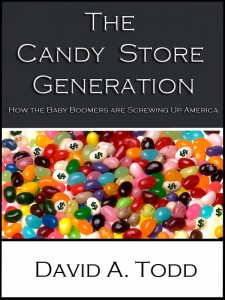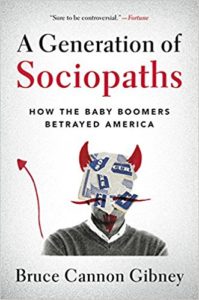
In my 2012 book The Candy Store Generation, my last chapter is titled “Had Enough”. My premise there is that the Boomers won’t fix the mess they made, and it will fall to a future generation to come to the point where they’ve had enough of the Boomers, and somehow right the ship. I’m hoping it’s the Gen-Xers, maybe in combination with the younger Boomers. I said I was more than ready for the Had Enoughs, whoever they will be, and suggested they may have to take drastic measures.
I just read a book that I’ll call the first salvo from the Had Enoughs: A Generation of Sociopaths: How the Baby Boomers Betrayed America, by Bruce Cannon Gibney. It came out this year, and Gibney’s been doing lots of media to promote it, though I always seem to miss him. When I learned about the book, and researched it as best I could, I reached out to Gibney’s publicist, requesting to interview him on my blog. She said he had no time for that, but that she would send me a review copy of the book. I jumped on that.
Gibney is a Gen-Exer, I think of the Disco Wave of that generation, giving him a fair amount in common with the Disco Wave of the Boomers. I say “I think” because I can’t find out his age. He may be 51, making him younger than the Disco Wave. In calling the Boomers “sociopaths”, Gibney goes much farther than I did. He says we Boomers, as a lot (though there will be exceptions) are antisocial, in the sense that we care nothing about society, caring only for what benefits us, what furthers out position. He quotes extensively from the Diagnostic and Statistical Manual of Mental Disorders to show how Boomer traits are anti-social.

Maybe so. I’m not willing to go there. I just think the Boomers are running everything into the ground through inability to manage anything. Business, government, households, pensions, all are being mired in unpayable, unserviceable debt. That’s the premise of my book. Gibney agrees. He spends a lot of time on that, though attributing Boomer failure to their sociopathic tendencies. History can judge between us.
Gibney talked about how the Boomers were raised, how they reacted to the Vietnam War, and has much to say about “neo-liberalism”. I really can’t figure out what that is, but he says it’s a bad thing, and the conservatives are guilty of it. I’d have to read the book again to better understand that part of his argument. Gibney’s book is much better researched than mine. I got a lot of data from Congressional Budget Office, and used Wikipedia to determine ages of Congress and know when the Boomers took over. My graphics are only fair; Gibney’s are much better, though I would have thought that, with the budget of a major publisher behind him, they would be stellar. They are not—only much better than my inferior ones. I also used my experience of having been a Boomer (of the Beatles Wave) and having lived through it all, something Gibney can’t do.
I disagree with much of what Gibney says, not the least of which is his definition of the Baby Boomers. He says they are those born between 1940 and 1964, they are white, and native born. I know of no other book that have the Boomers other than born in the years 1946 to 1964. I don’t know how you can exclude Black or Hispanic Americans from the Boom. Methinks Gibney is feeling a lot of white guilt. That’s okay. He made his millions investing in startups such has PayPal (started by his roommate at Stanford), Facebook, Palantir, Spotify, and more. I guess when you’re younger than 50 and worth millions, you can indulge in guilt, no longer having to worry about where your bread is coming from.
I also think Gibney focuses on some wrong items. For example, he blames the Boomers for things that happened in the 1960s and 1970s, even the 1980s, before they were in power. He kind of forgets who was in power then. But he says that those in power were catering to the Boomers, who were a large voting and purchasing block. So, it’s the Boomers’ fault that their predecessors screwed up certain things. No, I disagree. It’s the Boomers’ fault that they didn’t right the ship when they had the chance, instead letting it drift into stagnant waters and, their future being secure, didn’t try to make things better for those who would come after them.
Gibney writes with an Eastern Megalopolis view, slanted by California elitism. He is a product of the city. So am I, though my time in the Midwest, overseas, and the south for three decades has hopefully given me a more rounded perspective. Yet, having looked at the same data, come to more or less the same conclusion, we there depart the most in saying what needs to be done. Gibney says we should stop sending funds to rural areas; the cities need them. We should stop throwing so much money after the health care of the elderly (the Boomers beginning to be there), stop doing extreme procedures to extend life, instead letting the sociopathic Boomers just die and stop burdening the young. He wants to borrow $8.6 trillion to immediately fix what the Boomers ruined, and pay for it by growth, which he believes will happen once the Boomers move out of leadership positions.
My conclusion was the Boomers screwed things up by wanting benefits but not wanting to pay for them by taxing themselves, instead borrowing their children’s retirement funds and their grandchildren’s college funds. My solution: quit borrowing, reduce benefits for those who didn’t pay for them. His solution is to move the Boomers out of leadership ASAP, raise taxes, fix what they broke, and put it all on a sound footing. It’s hard to believe that, from the same data, we come to such different conclusions.
It hurt to read Gibney’s solutions. I got angry at them. Then, I remembered what I wrote in my last chapter: “They [the Had Enoughs] will embrace what Thomas Jefferson had to say about inter-generational debt, and will see entitlements as one generation unjustly imposing their will upon a later generation. What will be the first to go? A reduction in Social Security benefits will probably be first…. The Boomers will counter…. The Had Enoughs will laugh at them, and ask, if those retirement and health benefits were so important to you, why didn’t you put them on a more stable footing? Why did you squander trillions of dollars on corporate welfare to save companies you mismanaged?”
Yes, I said I longed for the Had Enoughs to make their appearance. Perhaps in Gibney they have. If so, the next two decades are not going to be pretty.
Wow, how interesting to find a book that covers a very similar issue to one of yours! I haven’t heard of it, or the author, so I enjoyed your review. It’s kind of strange, given the book’s theme, that the author didn’t mention his age. I enjoyed your “Candy Store” book a lot, and think your conclusions seem more sound. Calling the Boomers sociopaths seems unnecessarily dramatic — maybe that’s on purpose, to create attention? I agree too that I’m not crazy about the cover.
Interesting, David. I took the opportunity to look back at my review of The Candy Store Generation. You may recall that I said it was a mistake to set one age group against another; that it was our (those of us born during or just after WWII) parents who invented easy credit and built in obsolescence; that the state’s indebtedness was at least as serious as that of private individuals.
I would only add now that, within each generation there is the majority who do their best to take care of themselves and their families, those who scam the system to make money for nothing and those who devise ever more complex ways of screwing over the rest. These latter may or not be sociopaths, they almost certainly are greedy (and that may well be a symptom of their sociopathology). They are these things, not because of their date of birth but because that is they way they were taught by their parents.
I might add that you now have one of them as POTUS, a fact that terrifies me.
This is very strange — I typed up a comment on this yesterday, but I guess it was “eaten” somewhere in cyberspace. Anyway, I enjoyed this review and feel like it must be pretty interesting to read a book on a topic you’ve also written one on. Having said that, I found your book very interesting but think this one would drive me nuts — so I’ll be skipping it. It seems odd that the author wouldn’t divulge his age, since it seems that would affect his viewpoints on this issue. And calling Boomers sociopaths seems unnecessarily inflammatory — although maybe that was done on purpose, to draw attention/sales? I agree too that I don’t care for the cover. I enjoyed your review. Interesting topic!
Susan: Your first comment was waiting in Moderation. I need to moderate all posts because I have some spammers who would hit me with 100 comments a day if I didn’t restrict posting.
Frank: I appreciate your comment. I tried to read your blog post on the subject today, but couldn’t do it on my phone. I’m at a real computer now, so will go read it straightaway.